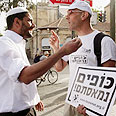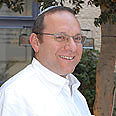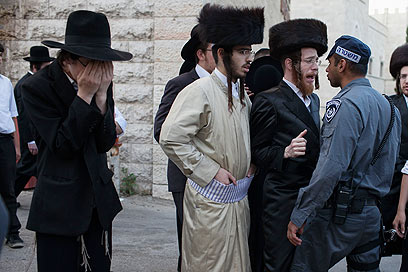


A new Ynet-Gesher poll reveals that the majority of the Israeli public is against nullifying religious laws, but is in favor of drafting haredim, operating public transportation on Shabbat and recognizing civil marriage.
The survey was conducted by the Panels research institute through the Panel4all Internet panel among 508 respondents – a representative sample of Israel's adult Jewish population (maximum sampling error: 4.3%).
55%: Keep stores closed on Shabbat
In the first section of the survey, respondents were asked about their stand on religious legislation: The Chametz Law, the restriction on opening stores on Shabbat, the law banning the rearing of pigs, and others.
Fifty-five percent of respondents believe these laws should not be repealed, 40% think they should be repealed, and the remaining 5% offered no opinion on the matter.

Only 40% want religious laws to be nullified (Photo: Alex Kolomoisky)
Out of the 55% in favor of keeping religious laws, 43% explained that they wanted to preserve the State's Jewish identity while 12% said they wished to maintain the status-quo between religious and secular Jews.
Out of the 40% in favor of nullifying the laws, 20% said such legislation makes people hate religion and can anyway be bypassed. Only 18% believe that religious legislation is illegitimate in a democratic, liberal country.
An analysis of the responses according to religious affiliation reveals, as expected, that 65% of seculars are in favor of nullifying religious laws, while 89% of haredim, 78% of religious Jews and 65% of traditional Jews are in favor of keeping them.
70%: Operate buses on Shabbat
As for the issue of public transportation on Shabbat, 70% of respondents said they fully supported operating buses on the day of rest in all parts of the country (25%) or at least partially, in areas with a secular majority (45%). Twenty-eight percent opposed the idea, arguing that it would offend religious sentiments and the sanctity of Shabbat, while 2% did not respond.
An analysis of the results reveals that 53% of seculars and 55% of traditional Jews are in favor of operating public transportation on Shabbat, at least partially, while 86% of haredim and 76% of religious Jews are in favor of maintaining the current situation.

Haredim protest opening of parking lot on Shabbat (Photo: Ohad Zwigenberg)
The survey further shows that 61% of the public believe the next Knesset should enact a law recognizing civil marriage in Israel (87% of seculars and 57% of traditional Jews), while 31% oppose such a law (77% of haredim and 72% of religious Jews) and 8% offered no opinion on the matter.
'Significant gap between secular and religious'
And what about the haredi draft – one of the most controversial issues in the State of Israel?
Sixty-three percent of respondents believe all Israeli citizens should share the burden (22% think all citizens must join the army, while 41% view civil service as a reasonable alternative), 19% believe enlistment should be encouraged in any way but not forcibly, 8% are in favor of setting a quota for outstanding yeshiva students who will be exempted from military service, 6% are in favor of reinstating the Tal Law, and 4% said the Knesset must exempt all haredim from this civil duty in order to prevent a war between brothers.
Sixty-six percent of haredim believe yeshiva students should be exempted from military service through the Tal Law or any other legislation, 88% of seculars and 70% of traditional Jews said they should at least be forced to do civil service, while religious Jews were divided between encouraging enlistment without coercion (34%) and enacting a law forcing enlistment at a certain volume (47%).
Ilan Geal-Dor, CEO of the Gesher Foundation which works to bridge the gaps between different segments of the Israeli society, said in response to the findings that a significant gap remained between religious and secular Jews in regards to religious laws.
"This does not necessarily reflect a gap in regards to the State of Israel's Jewish character, but in regards to the process. We at Gesher believe that the nature of the State's public domain must be determined in a decision shared by all residents rather than just one side."















